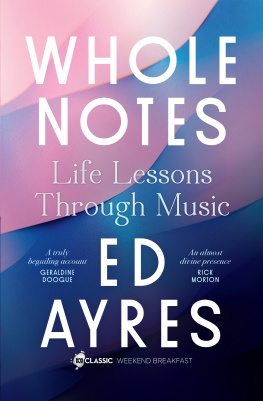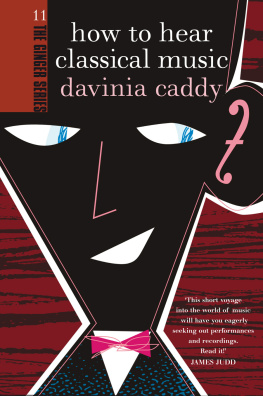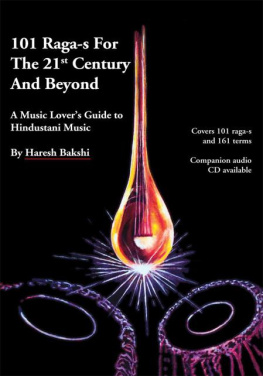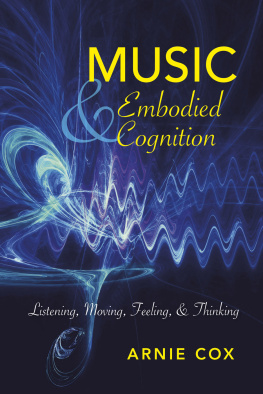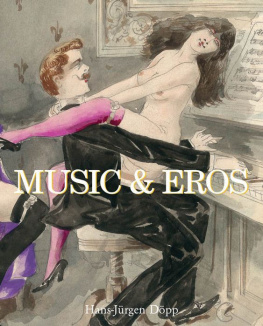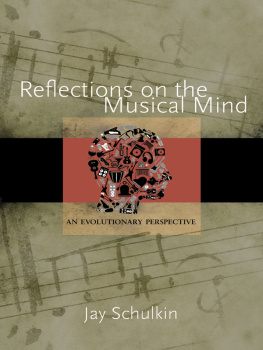You Are The Music
You Are The Music
How Music Reveals What
It Means To Be Human
Victoria Williamson

Published in the UK in 2014 by
Icon Books Ltd, Omnibus Business Centre,
3941 North Road, London N7 9DP
email:
www.iconbooks.net
Sold in the UK, Europe and Asia
by Faber & Faber Ltd, Bloomsbury House,
7477 Great Russell Street,
London WC1B 3DA or their agents
Distributed in the UK, Europe and Asia
by TBS Ltd, TBS Distribution Centre, Colchester Road,
Frating Green, Colchester CO7 7DW
Distributed in India by Penguin Books India,
11 Community Centre, Panchsheel Park,
New Delhi 110017
Distributed in South Africa by
Jonathan Ball, Office B4, The District,
41 Sir Lowry Road, Woodstock 7925
Distributed in Australia and New Zealand
by Allen & Unwin Pty Ltd,
PO Box 8500, 83 Alexander Street,
Crows Nest, NSW 2065
Distributed in Canada by Penguin Books Canada,
90 Eglinton Avenue East, Suite 700,
Toronto, Ontario M4P 2YE
ISBN: 978-1-84831-653-9
Text copyright 2014 Victoria Williamson
The author has asserted her moral rights.
The quotation from T.S. Eliots Four Quartets on page 1
is by kind permission of Faber & Faber Ltd.
No part of this book may be reproduced in any form, or by any means, without prior permission in writing from the publisher.
Typeset in Dante by Marie Doherty
Printed and bound in the UK by
Clays Ltd, St Ives plc
Contents
Acknowledgements
It all started about five years ago. I did not know quite what to think when my partner Oscar gave me musicpsychology.co.uk as a birthday present. He explained himself quickly: I loved talking about the psychology of music and this was a chance to discuss my passion with the whole world. He was right (yes, I said it). The blog soon became my baby and this book is the culmination of over a decades exploration into the wonderful world of music psychology. So thank you Oscar, for everything.
I am hugely grateful to all the magnificent people at Icon Books, especially to Duncan Heath, who supported me throughout the writing process, to Andrew Furlow and Henry Lord for their enthusiasm and creativity, and to Robert Sharman for his keen and careful eye. I am grateful, too, to the talented Richard Green for his striking cover design. I consider myself very lucky to have had such a great team behind my book.
Many students, colleagues and friends have been generous with their time in discussing both this book and the psychological impact of writing it upon the author. I could not possibly name all these kind souls but I want to make special mention to Joydeep Bhattacharya, Rhiannon Jones, Pamela Heaton, Daniel Mllensiefen, Georgina Floridou, Maurice Douglas, Danielle Richardson and Team Barcelona.
Dad, thank you for the baby taming, the music lessons, the instruments, the lifts to music centres, the speakers, the vinyl, the music-filled holidays, and for reading every chapter of this book with the same vigour and humour that you once reserved for my maths homework. You are my hero.
Finally, this book is dedicated to my amazing, supportive, enthusiastic, loving, one-of-a-kind family.
Introduction
You are the music / While the music lasts
T.S. ELIOT, FOUR QUARTETS
Since you have been so kind as to consider reading this book I am going to assume that you have an interest in music; why we love it so much and how it affects us. Me too!
I promise to assume nothing else about you. To read this book requires no expert knowledge of or training in music, psychology, brain science, or any other kind of academic discipline. All you need with you on this journey is your curiosity about music.
The reason for this book, and for my career, is a passion for music. I am, at best, an amateur musician. I love my classical guitar (The Professor) but we see each other rarely these days what with work demands, so my musical interests dont come from the viewpoint of a skilled performer. Nor would I consider myself to be particularly knowledgeable about music. I am not a sophisticated listener; more a musical chameleon. I rarely come across music that I dont enjoy on some level.
I put the blame for my music addiction squarely on my dad. When I was born he acquired a lovely book called Baby Taming (seriously), which stated that playing loud music at bedtime helps a child to sleep deeply and with less disruption. I have no idea whether this pop psychology contains any truth as far as I know the claim has never been tested but my dad needed little encouragement to fire up his Celestion Ditton 66 speakers and crank out the vinyl every night.
As a result of this baby book and my dads love of vinyl I have been surrounded by music from day one. Not music practice or performance so much, as neither of my parents could play an instrument. Rather, in my family music was in the air.
I was fortunate to go to a primary school that offered free instrument lessons for a time and I chose to play the guitar, though I also dabbled in mandolin, recorder and flute. I had formal music lessons on classical guitar, with a charming teacher named Andrew Forrest who instilled in me a love of Spanish music, especially Fernando Sor, Francisco Trrega and Isaac Albniz. I enjoyed my formal lessons until the age of eighteen but took few music exams as I found them too stressful.
Alongside my formal music education I had increasing access to my favourite music as I grew up thanks to the explosion in the availability of compressed music and portable devices. And the music listening revolution has continued in my adult life with developments like cloud-based systems for musical storage. Today this means that people need never be far away from their top tunes. And I never am. I am listening to the wonderful Three Tenors as I write this introduction. I had BBC music radio playing in my car on the way to work this morning. My dads beloved Celestion Ditton 66 speakers now take pride of place in my living room.
Not only am I addicted to music, I am also addicted to working out why I am addicted to music. (I believe that is what is known as an over-analytical mind.) I blame my passion for studying my musical addiction on a handful of inspirational academics that I have been lucky enough to meet on my journey as I studied psychology, the psychology of music, and finally as I began my research career. There are too many people to name individually, though deserving of special mention are my academic fathers and inspirations, Professors Alan Baddeley and Graham Hitch.
I have devoted my research career to understanding how and why music is so much a part of our everyday lives. There are already many technical books out there that explore aspects of music psychology a young and vibrant science that examines the relationship between music and our mind, brain, and body. There are also excellent compilations, essay collections and student guides, for which I am hugely grateful as a lecturer. But I wanted a book that I could recommend to a friend who was keen to learn about the impact of music on everyday life: the person who listens to their iPod on their way to work and who refuses to contemplate a long car journey without music; the parent who takes their child to musical activity classes or pays for formal music lessons; the person who owns a shower radio, looks forward to concerts and gigs, shops to a soundtrack, and who carefully selects music for a romantic night to ensure maximum seduction; the person who cant help but be transported back to that one perfect evening when they hear that song. I wanted an easy-to-access guide book that explained everyday music psychology for everyone so I decided to write it.
Next page

